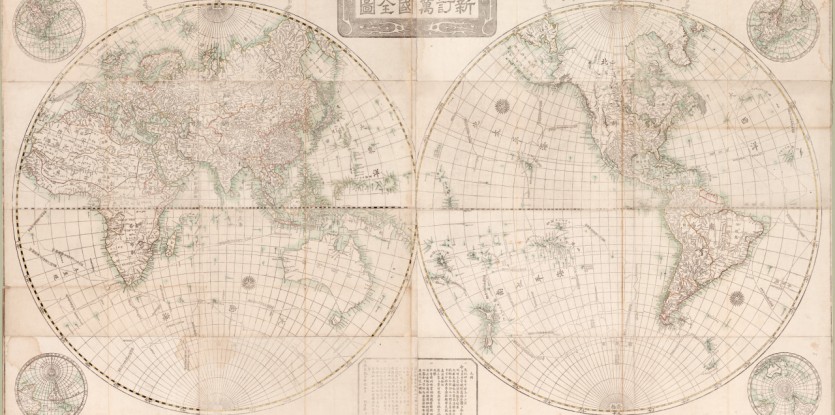And Caleb silenced the people toward Moses…
Numbers 13:30He cried aloud, saying: ‘Is this all that the son of Amram [Moses] has done to us?’ One who heard him speaking in this way was under the impression that he was about to speak disparagingly of Moses. Since they had hard feelings toward Moses because of the words of the spies, they all became silent to hear his criticism. Said [Caleb], ‘Did he not split the sea for us, bring the Manna down for us, and collect the quails for us’…
Rashi on verse
Have you ever dreamed that one day our world could actually become a better place, only to conclude that such hope is merely a utopian fantasy? The concept of “Global Perfection” is seemingly one that is as unrealistic as it is idealistic. Our world is flawed, brimming with evil, pain, and suffering. Man has reached new heights, walked on the moon, and yet at the same time plumbed the depths of inhumanity to an extent that one would not have believed possible. To fathom a perfect world is to imagine a completely different realm of being, one that is not marred with the natural imperfection of physicality but is rather an angelic abode where celestial beings reside in complete harmony. Our world is so steeped in imperfection that the notion that it, our very existence, could reach a state of utter perfection is one that evokes ridicule. And the idea that we, mere human beings of flesh and blood, can be the catalysts for this utopian state is entirely preposterous!
Yet Judaism teaches that this ultimate state of being is not mere fantasy, but a reality that will soon be experienced in the Messianic Era. In the words of Maimonides: “In that time there will be neither famine nor war, neither hatred nor competition, for good will flow freely, and all delights will be as common as the dust.”[1] Furthermore, Torah teaches us that we are the ones who have been entrusted with this mission; it is the cumulative efforts of mankind throughout the ages that will eventually usher in this revolutionary epoch.[2] How are we, rational human beings who recognize the imperfection of the world and of ourselves, to view this seemingly impossible mission?
The Story
The Jewish people encountered a similar dilemma 3311 years ago.
The exodus from Egypt was little more than a year old. In one stroke, we had become a nation. Fifty days later, with the revelation at Mount Sinai, we were entrusted with G-d’s Divine directive—the Torah. All that we lacked was our own land, and as we stood encamped at Kadesh, on the border of the land of Canaan, this too was about to become a reality. Then, tragedy struck. The Jewish people, surrendering their faith in G-d to doubts of their own military prowess, demanded of Moses, “Let us send men before us so that they shall search out the land for us and bring back word as to which road we should take and into which cities we shall come.”[3] After consulting with G-d, Moses agreed to their request, and twelve spies were duly dispatched, one representative from each of the twelve tribes.
Forty days later, on the eighth day of Av, the spies returned from their mission, native produce in hand, and issued their assessment of the land in the following statement:
“We came to the land to which you sent us, and indeed it flows with milk and honey; this is its fruit. However, the people who dwell in the land are strong, and the cities are fortified and very great; we also saw giants there. The Amalekites dwell in the Negev; the Hittites, the Jebusites and the Emorites dwell in the hills, and the Canaanites dwell at the sea and on the banks of the Jordan.”[4]
It was at this point that Caleb (the representative of the tribe of Judah), sensing the impending disaster, passionately proclaimed, “Let us go up and occupy the land, for we are able!” Tragically, his pleas fell on deaf ears, and the people, swayed by the negative rhetoric they had already heard, grew despondent and doubted their ability to enter the new land.
“All night the nation wept and bemoaned their fate, crying to Moses and Aaron… ‘Why is G-d bringing us to this land to fall by the sword, and for our wives and children to fall into captivity? It would be best to return to Egypt!’”[5]
Because of their lack of faith and unwillingness to enter the land, the entire generation (with the exception of Caleb and Joshua[6]) was deemed unworthy, destined to fulfill their lives wandering in the desert until, some thirty-eight years later, a new generation was prepared to carry the torch.
The Jewish people, forgetting the miracles and wonders they had so recently experienced at the hand of G-d, had succumbed to their fear of the unknown, melting under the pressure of the challenge they faced in conquering an unknown land.
What was the message that Caleb was conveying, and what relevance does it hold for us in overcoming the challenges that we face today?
The Claim
The human mind is quite remarkable, enabling the stubborn man to rationalize his whims with “logical” explanations. Being shown the fallacy of his argument serves not as a refutation, but provides another opportunity to express creativity and ingenuity. This self-righteous curse can afflict us all, dragging us down by essentially blocking out all objectivity. Nowhere was this destructive cycle more apparent than in the story of this week’s parsha.
Clearly, the spies (apart from Caleb and Joshua) did not wish to enter the Land of Canaan,[7] and so produced three seemingly sound arguments to support their stance:
“The people who dwell in the land are strong, and the cities are fortified and very great”
The first and most logical accusation was that the mission of conquering the nations of the land was simply too difficult, in a word, unrealistic. Thus, they began their propaganda with scare-tactics—insinuating that the strength of the land and its inhabitants was too awesome to overcome.
“The Amalekites dwell in the Negev”
That initial argument, though compelling, was nonetheless not entirely effective for a people whose belief in G-d’s promises is innate,[8] and who, having G-d’s assurance, would have no doubt in their ability to overcome the indigenous population. It was therefore necessary to imply a more dangerous assertion, one that hit closer to home: that we are simply not worthy enough to merit G-d’s miraculous aid in conquering the land.[9] The very fact that the people demanded spies in the first place is proof enough that they lacked complete faith in G-d and their worthiness of His continued miracles. There was even a historical precedent for this: their fierce battle with Amalek was a result of their doubting G-d.[10]
“The Hittites, the Jebusites and the Emorites in the hills, and the Canaanites at the sea and on the banks of the Jordan”
The necessity of this argument stemmed from the weakness of their previous claim, for G-d eventually acquiesced to the peoples’ request,[11] proving that sending spies was not contrary to the Divine Will. The spies therefore countered with their final argument: although we have been promised success in conquering the land, who says that G-d will help us against the nations that we will encounter on our journey prior to reaching the land?[12]
The Rebuttal
As Rashi explains, Caleb responded to the other spies by first citing three miracles that Moses elicited for the Jewish people. By doing so, he intended not merely to demonstrate the possibility of a miracle, but rather to answer their specific challenges point by point:
“You assert that the task of conquering the land is too difficult,” began Caleb. “Do you not remember your fear when you found yourselves trapped between the wide expanse of the sea and the oncoming onslaught of Pharaoh’s army? Have you forgotten the emotion of hopelessness that coursed through your veins at that moment, looking from one adversary to the other, thinking that what had almost become reality was suddenly in jeopardy? And do you remember the feeling of sheer joy at witnessing the salvation that came directly from His all-powerful Hand, as He split the sea for us, allowing our safe passage, while simultaneously drowning our former taskmasters in the water’s murky depths? Do you not remember how quickly that “insurmountable” obstacle vanished?
“You also claim that we are unworthy of G-d’s miracles! How soon you forget your demand for meat, which was miraculously granted with the quails despite the wantonness of your intentions.[13]
“Furthermore,” continued Caleb, “take a look at the Manna that we are given to eat everyday. Although we have not settled in the Holy Land and are merely traversing the desert in preparation of that great step, the Almighty nonetheless showers us with His supernatural blessing! How can you even entertain the idea that G-d would not provide salvation on the road to our future homeland?”[14]
For the first time since their return, the spies, along with the entire nation, remained silent,[15] recognizing the truth in Caleb’s impassioned plea. Tragically, though, the people chose not to repent—for such is the power of stubbornness.
Closer to Home
Now, as then, there is a mission that must be fulfilled, a goal that stands just ahead on the horizon. We, the Jewish people, have been charged to change the world, to perfect it one corner at a time,[16] and this process begins with refining our own character.[17] We can refuse to accept this mission—offering excuses that it is too difficult, that we are too weak, that there are unforeseen challenges that lie in wait along the journey—or we can embrace the challenge, drawing strength from Caleb’s inspiring words which still resonate in our ears, encouraging us to go onward, telling us that success is not just a possibility, but a guaranteed reality. Now, as then, the choice is ultimately ours. However, we have the benefit of hindsight: the ability to draw lessons from our history, making sure we never again repeat the tragic mistakes of the past.
Let us not squander the tremendous opportunity we have been granted. Let us accept the challenge—and triumph.
Based on an address of the Rebbe given Shabbat Parshat Shelach 5726 (1966)[18]
Adapted from the teachings of the Rebbe by Ari Sollish
[1] Mishneh Torah, Laws of Kings, 12:5.
[2] C.F. Tanya, Likkutei Amarim, beginning of ch. 37.
[3] Deuteronomy 1:22.
[4] Numbers 13:27-29.
[5] Ibid., 14:1-3
[6] Joshua represented the tribe of Ephraim, and was the only spy other than Caleb to maintain faith in their mission. See Ibid. verses 6-9.
[7] For the explanation of their motives according to Chassidic thought, seeHoly Land, WIR, vol. X, no. 38.
[8] Talmud, Shabbos 97a; Bamidbar Rabbah 7:5; Midrash Tanchuma, Shemos 23.
[9] This demonstrates how the stubborn mind pulls out all the stops to prove its point, even if it requires putting down the very subject it is trying to defend.
[10] See Exodus 17:7-8: “The people had argued and tested G-d, by asking, ‘is G-d with us or not?’ Amalek came and attacked Israel in Rephidim.” Rashi explains the sequence of verses, that G-d allowed Amalek to attack the Children of Israel precisely because they doubted His presence amongst them.
[11] As G-d tells Moses at the beginning of our parsha, “Send men for yourself to tour the Land of Canaan…”
[12] Although the Jewish People were encamped near the border of Canaan, there were still battles to be fought before they actually entered the land.
[13] See Rashi to Numbers 11:1,4.
[14] The sequence of miracles mentioned here [i.e., first the splitting of the sea, then the miracle of the quails, and finally the giving of the Manna] follows the order necessary to respond to the spies’ arguments. Rashi, however, states the miracles in chronological order, thus the miracle of the Manna precedes the miracle of the quails.
[15] This is in stark contrast with the reaction of the people to Joshua and Caleb’s plea later in the narrative, which not only did not silence them, but also incited them so severely that “the entire nation wished to stone them”—Ibid.14:10.
[16] The concept of refining the material world is analogous to the mission then to transform the “Land of Canaan” into the “Holy Land.”
[17] The Zohar explains that the “seven nations of the land” refer to the seven evil character traits within man that must be sublimated in order for him to reach his true potential.
[18] Likkutei Sichot, vol. VIII, pp. 82-93.







